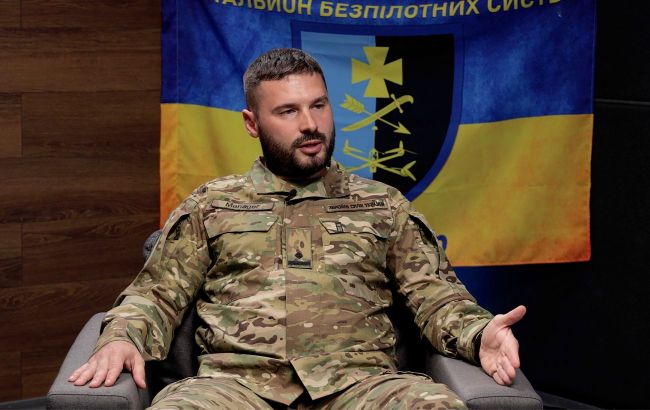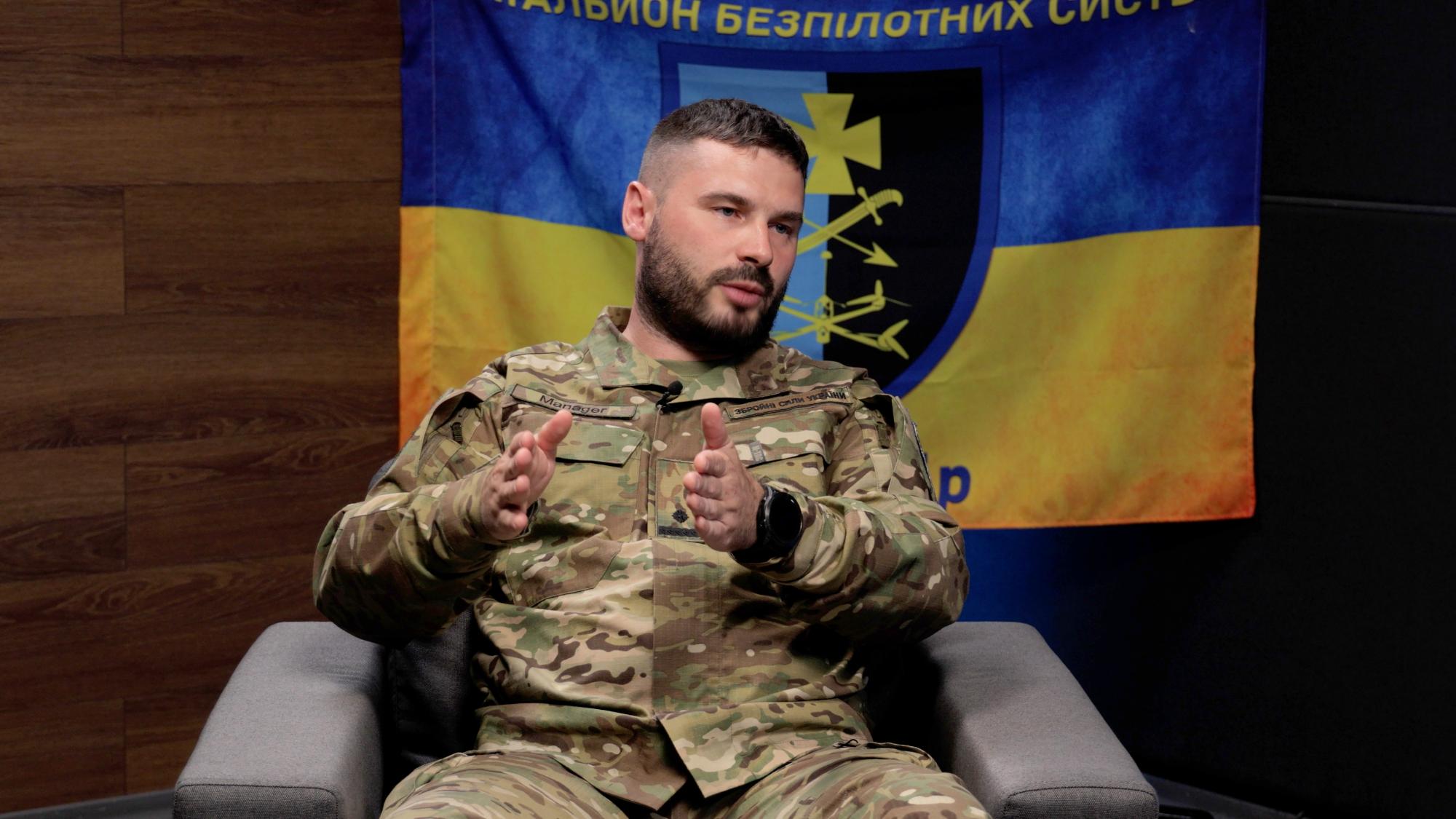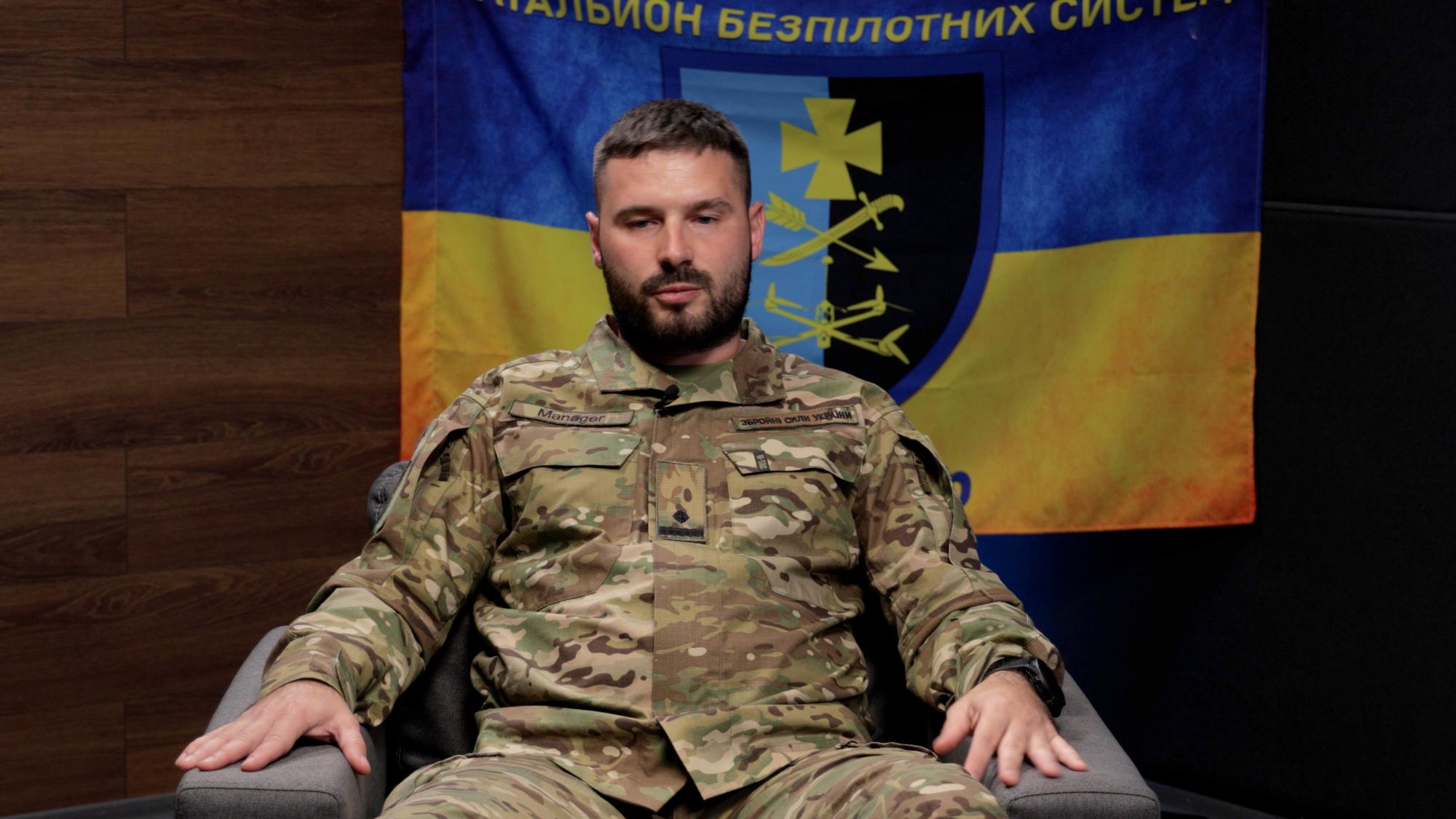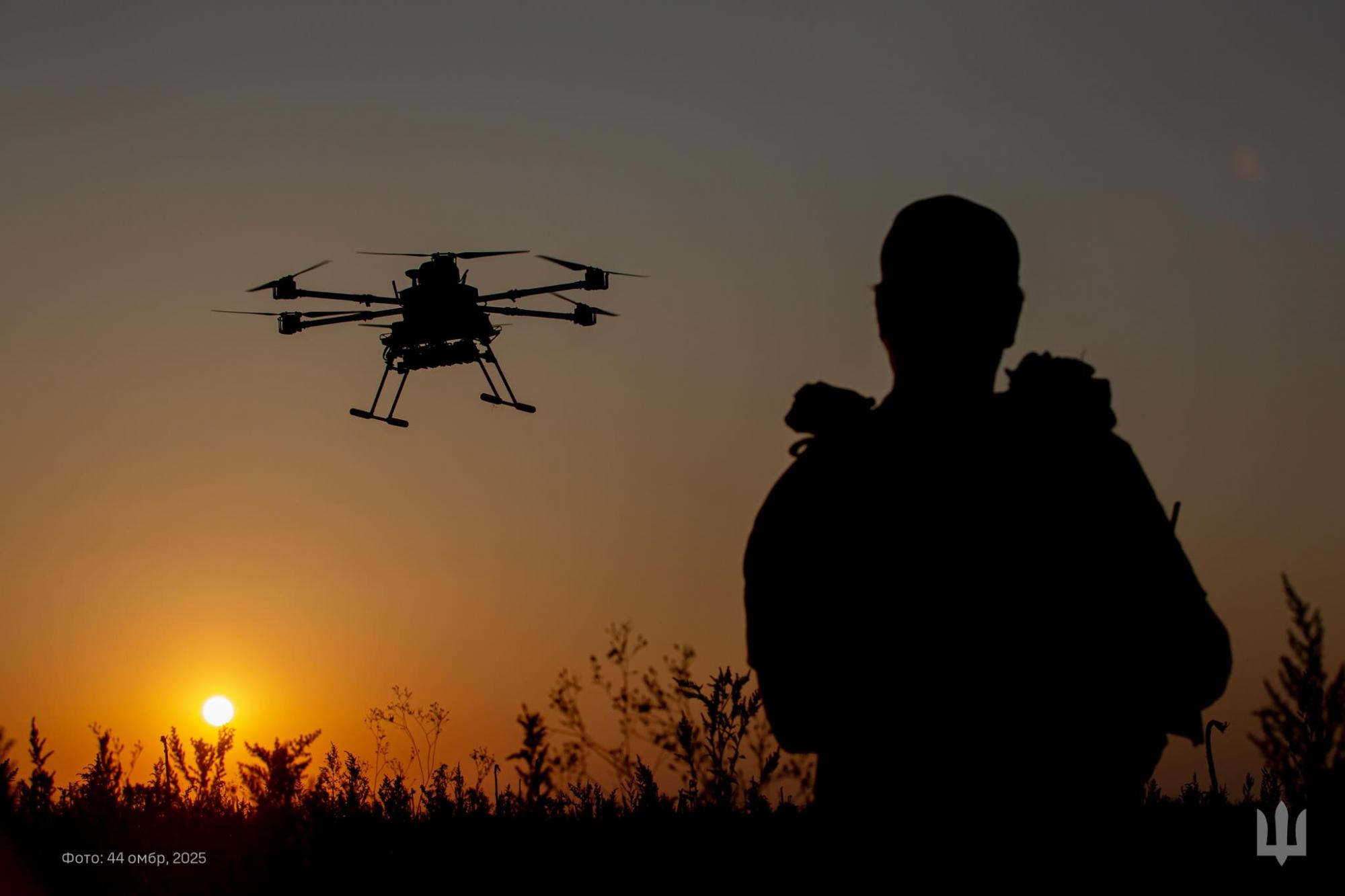'We lack manpower to hold every meter of the front': Interview with Ukraine's drone battalion commander
 Commander of the 44th Brigade's Unmanned Systems Battalion Viacheslav Shutenko (photo: RBC-Ukraine)
Commander of the 44th Brigade's Unmanned Systems Battalion Viacheslav Shutenko (photo: RBC-Ukraine)
Viacheslav Shutenko, commander of the 44th Brigade's Unmanned Aerial Vehicle Battalion, spoke to RBC-Ukraine about Russia's change in tactics, the challenges of mobilization, and the heroism of Ukrainian drone operators.
In war, drones detect assault groups, cover infantry, destroy equipment, and literally save lives. But despite technological innovations, the human factor remains decisive.
Viacheslav Shutenko has served in the 44th Brigade since 2023. At first, he was the deputy commander of a rifle battalion and fought in the Kupiansk direction. "We defended Synkivka and Petropavlivka. The unmanned systems battalion was created in March 2024, and in May, I was appointed its commander," he recalls.
The new unit was formed on the basis of a company of strike unmanned systems. In fact, a small company was used as the basis for building an entire battalion, which was to combine reconnaissance, strike, and specialized groups.
Drones that saved Kupiansk direction
Shutenko had already been developing unmanned units in the rifle battalion. They became a key factor in defense at the end of 2023. "Back then, the nature of the fighting was different. Russian troops came in waves — five, six, seven groups a day. And the days were short because it was winter. Imagine: six assaults per day. It was the drones that allowed us to detect these groups in time and strike them before they reached the infantry," recalls the officer.
Reconnaissance teams detected assault groups that were already moving out from their starting line to attack. Then the strike teams were deployed. They did everything possible to destroy Russian assault groups before they reached the front line, the infantry.
"Of course, I cannot fail to mention the heroism of the infantrymen, who at that time were engaged in daily close combat with the Russian troops. Of course, with the help of timely detection, it was possible to warn the squad commanders that the Russians were approaching. They began firing in advance in the direction of the landing zone and so on," says Viacheslav.
Small arms fights remain
Despite the widespread use of drones, close combat has not disappeared. The likelihood of close contact depends on the direction of the front line and even the season.
"It's summer now, there's a lot of greenery. Russia makes good use of camouflage. Even with dozens of reconnaissance drones, it's possible to miss an assault group. And then the infantry engages in small arms combat," explains Shutenko.
There are also other situations when close contact is initiated by the Ukrainian side. This happens when Russian infantrymen are spotted taking cover in the gray zone.
"There were cases when we detected this with strike drones and began to destroy the cover. Then, probably after suffering concussions, these assault troops came out and were completely disoriented on the terrain. They did not go in their direction, but in the direction of our infantry. In such cases, the infantry was also warned and engaged in small arms fire to destroy Russian forces," says the commander.
'Russians are not stupid'
Despite existing societal stereotypes that often did not take them seriously, the Russian military has made significant advancements in unmanned systems. Viacheslav emphasizes that he is categorically opposed to a dismissive attitude toward the enemy.
"Yes, they have elite units, just like we do, which effectively use unmanned technologies, in which huge amounts of money are invested. They are given unlimited access to all the resources necessary to fight on the front lines. These units exist, and the bad news for us is that their numbers are also growing," he explains.
 Viacheslav Shutenko has been serving in the 44th Brigade since 2023 (photo: RBC-Ukraine)
Viacheslav Shutenko has been serving in the 44th Brigade since 2023 (photo: RBC-Ukraine)
"This story about everyone laughing that our enemy is stupid and dumb was a big problem. Everyone saw that we are fighting a serious enemy, that we are really fighting the second army in the world. I want to emphasize that it is a very big mistake to underestimate the enemy," Shutenko says.
According to the battalion commander, we did indeed underestimate the capabilities of the Russians at a certain point. The Ukrainian side did not scale up the intangible technologies that we had much earlier as quickly and efficiently as it could have.
"What is our problem? When we have some innovation in the field of unmanned technologies, it takes quite a long time before it is scaled up to the level of the entire army and becomes available in most units," the commander notes.
In contrast, this happens very quickly for the Russians. When they see that something works, they quickly launch large-scale production, and this ultimately has a significant impact on events at the front. One of the latest stories is the scaling up of long-range drones that can fly deep into our rear and cut off logistics.
"As an example, I will cite these drones, the so-called queens. These are wings that carry FPV drones and fly into our logistics routes. Take the Dobropillia-Kramatorsk highway, for example. Three months ago, it was still passable. We were still driving there without any problems. Then, from time to time, they started shooting down cars there," says Viacheslav.
The Russians realized that they could fly to this important logistics route. They hit several cars when they realized that they could make this route extremely dangerous for the Ukrainian military.
"How can anyone say that they are stupid, dumb, incompetent soldiers, and so on? Nothing of the sort. We are fighting a very strong and serious enemy, and we must be aware of that. The fact that we can fight them speaks to our strength. I believe that we are one of the strongest armies in the world right now. Because we have this vast experience of war with such a strong enemy. And we can destroy it, we can resist it, the whole world can see that," the officer explains.
Reasons for breakthroughs and difficult decisions
In mid-August, the Russians were able to advance 15 kilometers into Ukrainian territory with two phalanxes in the Pokrovsk direction. The commander explains this temporary Russian success in the Donetsk region by a combination of factors: lack of forces, difficult conditions, and limited visibility due to the greenery.
"The lack of manpower is no secret to anyone. The units are not fully staffed, and this applies not only to infantry and assault units but also to unmanned aerial vehicle units. We are not sufficiently manned to effectively cover every meter of the front line that we have today," explains the commander.
An important aspect is the conditions in which we have to fight. Very often, visibility is limited in dense vegetation. And the Russians actively exploit this.
According to the commander, this was clearly the case this time as well—the Russians tried to find the blind spots and, in the end, managed to find them and advance in small infantry groups. Their tactics are usually simple—they conduct reconnaissance in force and try to advance from different sides.
 Everyone saw that we are fighting a serious enemy, that we are really fighting the second army in the world, – Shutenko (photo: RBC-Ukraine)
Everyone saw that we are fighting a serious enemy, that we are really fighting the second army in the world, – Shutenko (photo: RBC-Ukraine)
"All the reserves they have are being sent in this direction. They are pushing as hard as they can. And this is happening across the entire front line. And simply at some point, they found a weak spot. But this happened, I emphasize again, because the Russians simply realized that there were not enough resources, means, and people in this direction to effectively block it," explains Shutenko.
Commander's greatest fear and importance of truth
Shutenko admits that his greatest fear is the loss of people.
"I cannot come to terms with losses. They happen, and our unit has suffered losses. That is why it is the most difficult thing. And that is why maximum effort is directed toward protecting people," says the commander.
In order to protect their own people, everything is carefully planned before each sortie. The team thinks through the logistics of getting to their positions safely, equips the vehicles with electronic warfare systems, and additionally thinks through all the evacuation routes.
You can sit 20 kilometers away and not be of any use on the front line, keeping your people safe, notes the interlocutor. But first and foremost, the task is to support the infantry.
All our work is aimed at supporting them, detecting the Russians in time, destroying them, and preventing them from reaching the trenches where our guys are stationed. An ideal balance must be found, a perfect ratio between the safety of our personnel and the effectiveness of their work," says Shutenko.
We constantly strive to find a balance that makes our work as effective as possible. And to ensure that the risks of deployment are justified. The commander notes that the pilots of his battalion often work extremely close to Russian forces.
"The pilots also deserve credit. Now we have situations where they work 500 and 800 meters from the Russian troops, and they have worked 300 meters from them. Such situations have occurred. And they didn't shout into my radio, "Get us out of here, evacuate us." They continued to work at that distance," explains the commander.
Another factor that can save soldiers' lives and bring success on the battlefield is a correct assessment of the situation and one's own strengths. And most importantly, don't be afraid to tell senior leadership about it.
Viacheslav recalls a situation when he served in the 61st separate rifle battalion and was deputy commander during the defense of Kupiansk. His subordinates were restoring positions. And when the soldiers went to this position, the Russians met them with heavy artillery fire and all possible means of destruction.
They saw that it was very difficult there. And if they had simply gone forward and given the order to the guys to continue the assault, they would have simply lost them. Shutenko realized that the Ukrainian defenders needed to retreat and analyze everything that was happening. He reassured his command, which really wanted to retake this position that very day, but it was impossible to do so without losses.
 The soldiers of the 44th Brigade's unmanned systems battalion have many heroic deeds to their credit (facebook.com/44 separate mechanized brigade).
The soldiers of the 44th Brigade's unmanned systems battalion have many heroic deeds to their credit (facebook.com/44 separate mechanized brigade).
"I explained that we would retreat for now and let the guys rest, so that they would be better prepared the next time they went there. They listened to my arguments, allowed me to give the order for the assault group to retreat, and the guys withdrew. A day later, they went back to the assault and took the position without any losses on our side. Russia suffered losses," recalls the commander.
He emphasizes that one should not be afraid to tell the truth, especially when faced with tasks that are impossible to accomplish. The commander is convinced that even the smallest lie at any level leads to enormous problems.
Due to false information from various levels of command, a distorted picture reaches the higher command, which ultimately influences their global decisions.
Exploits of drone operators
Although crews have to work at extremely close range to Russian positions, they always try to do their job as effectively as possible and give their all, even in critical situations.
Viacheslav recalls a situation when, during the fighting, the front line shifted, but the aerial reconnaissance officers remained at their positions until the very end. The pilots worked until they received the order to move to safer positions.
According to the defender, they began to be remotely mined: their position had been discovered by the Russian troops. The military decided that they should take only the most valuable items with them. And most importantly, they had to save themselves. So they moved to another position.
"They moved, and then we established contact with them. They said: We only need to deliver a generator to this position, because we took everything else," says Shutenko.
They decided that they could do it. They removed their antenna and saved all the equipment. To resume work, they just needed to deliver one generator.
"I think this is very responsible. This is exactly the kind of work that inspires admiration and can be held up as an example. When I met them, I thanked them very much for their work and hugged everyone," recalls the officer.

